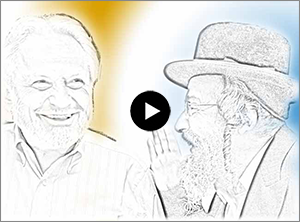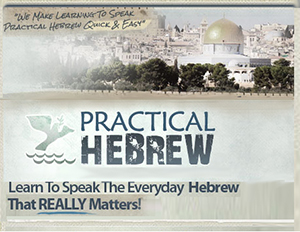Chanukah and Parshas Vayaishev
On the Shabbos before Chanukah it often comes out that we read Parshas Vayaishev. There are many connections drawn between Chanukah and Parshas Vayaishev.
Avodas Hashem
The Bach writes in his commentary on the Tur at the beginning of Hilchos Chanukah, that the main issue for which we were thrown into the hands of the Greek empire was because the Yidden were lax in the Avodas Hashem, in particular the Kohanim (sigh). The Greeks forbade us to offer up the daily Tamid sacrifice in the Holy Temple, and the Greeks said, “there’s one Miztvah that they do, that if you can get them to stop that, then they’re finished – the lighting of the Menorah.” Ultimately when the Kohanim and the rest of Klal Yisroel strengthened themselves, and were ready to give up their lives for the Avodas Hashem, then G-d did for the Jewish people the miracles that we mention in Al HaNisim, He delivered the many into the hands of the few, the strong into the hands of the weak, etc. And then the miracle of the oil, and the lighting of the Menorah.
In the spirit of the fundamental accepted premise that yearly Jewish holidays work such that the same spiritual illumination that happened then repeats itself every year, and that’s indeed how they explain what the gemora (Talmud) says that it was the next year after the miracle that the sages instituted Chanukah as a yearly holiday of Hallel and Hodaya, (to see whether the illumination repeats itself), so then it comes out that every Chanukah is a time where we can take ourselves to task for our laxity in Avodas Hashem, and strive to strengthen ourselves thereby.
Look, it was just two months ago that we worked on ourselves during Elul, Rosh Hashanah, Yom Kippur, Sukkos, and Shmini Atzeres/Simchas Torah. What an uplifting time, what plans we had for this year, what new year’s resolutions, excuse the expression, we took upon ourselves. And look at us now just two months later.
Strengthening oneself can be expressed both in quantity, and also in quality.
Chizuk
I wish to share a point from which I personally took chizuk, fortitude, this year. As I wrote above, we read the Parsha of Vayaishev around the time of Chanukah. I saw an idea brought down this year in the name of Admoray Amshinov. And I wish to preface, please — I do not take it upon myself to bring down Amshinover Torahs with exactness of content and exactness of depth. I am probably unable to. Just I want to relate to what I took from it, in the light of what I said about Chanukah.
We find that when the wife of Potifar came with her demand/request from Yosef HaTzadik, of course he answered “NO!” Subsequently, as Rashi explains from the words of Chazal, our sages, she tempered her request to share the same furniture without touching, and to be with him in Olam Habah, the world to come. The simple understanding is that sharing Olam Habah with her is part of the reason that he said no — how would he look, what would be his status for eternity if he falls for her plan.
But really one can learn that this was part of the enticement — she knew who she was dealing with, and it was absurd to think that Yosef Hatzadik would fall for such a base act. So she offered him an opportunity to increase his level in Olam Habah by putting himself in a nisoyon, a trial, and then not to do anything, no touching, rather to pass the test, thus gaining a Mitzvah so to speak, and raising his level in Olam Habah.
Mrs. Potifar, from her standpoint, was hoping that he would fail. This is a common strategy of the Yetzer Harah, that a person should approach a nisoyon, and hopefully (he thinks in the back of his mind) then he will be drawn in, and hopefully he will fail. Chazal tell us, for example, that one is not allowed to get too close to the outside door of a bais znus, even without going in.
But the truth is that Mrs. Potifar really didn’t know who she was dealing with. Because for Yosef Hatzadik it didn’t interest him in the least bit about “increasing his portion in Olam Habah.” That wasn’t what motivated him. He was interested only in doing the Ratzon Hashem (the Will of G-d), without any focus on his own reward.
Chanukah is the holiday where the role of the Kohanim is emphasized. I am a Kohen. In Birchas Kohanim, Rashi says there two perushim, explanations, about the verse VeAni Avarachaim (and I will bless them). One of them is that Hakadosh Boruch Hu will bless the Kohanim Himself. So now, a Kohen who stands on the duchan, he can have one of two things in mind, or a combination. He can think, “this is what I do in order to merit the blessing directly from Hashem Yisborach.” Or he can have in mind to be a kli, a cistern, through which the Brocho of Hashem flows through to bless the congregation. If the kohen wants to do his job correctly, he will only think about the latter, about being a kli to spread brocho, shefa. The brocho that the kohen gets is promised to him, it will come, whether that is his focus or whether that is not his focus. He will get his, he doesn’t need to worry, it’s automatic, the whole question is whether he has in mind to give to the others.
The hint that is hidden in my words I intended, but it should remain hidden.
My hope and prayer for myself and for anyone who reads this is that we should merit do the Ratzon Hashem, to do that which we are supposed to do, what G-d says, and to abstain from what we are not supposed to do, for its own sake (for G-d’s sake).





Leave A Response